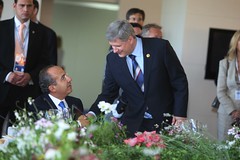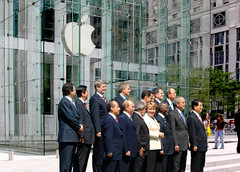Canada’s Prime Minister, Stephen Harper says this is a time for the country to shine, to show us off on the world stage.
That may be true, as media from around the world will be following the antics of world leaders during both summits.
However, consider this, in order to host both these events, security measures so stringent have been put in place, the image these international media-types are getting isn’t the Canada that we’ve come to know and love – or the rest of the world for that matter.
Internationally, Canadians are thought of as being a peaceful lot. Overly polite, friendly, beer drinking hockey fans – that’s us.
Thousands of riot police on horseback, foot and in armoured vehicles, waving batons, armed with fully automatic weapons, while military helicopters hover overhead. Huge concrete barricades, and solid steel fences surround designated “security zones,” as supposedly peaceful Canadian citizens are thoroughly questioned by heavily armed police prior to entering or leaving these “security zones.”
That’s the image the media are seeing now – today – right this very moment, because all the above is going on right now in Huntsville and Toronto.
Statues and historic buildings have been boarded up to protect them from battle. Mailboxes, newspaper stands, even some trees have been removed, because the lame-ass security company – which isn’t even licensed to practice security in Ontario (they are from British Columbia) – says they can be used as weapons against police.
Peel and stick Plexiglas – I didn’t even know they made that stuff – has been applied to the first three stories of all windows on all buildings within specific security zones. Other buildings have been boarded up with planks of wood.
These are the images the media from around the world are getting of peaceful Canada.
Famous tourist attractions are being shut down. Toronto’s most internationally recognizable symbol – the CN Tower has been ordered closed by the police, for fear it could draw protesters or even terrorists.
Toronto’s Major League Baseball team, the Toronto Blue Jays were scheduled to play a game here in Toronto this weekend – that’s been moved, again for security concerns.
Family-run mom and pop shops and restaurants – which really give Toronto it’s peaceful, multicultural spice – are allowed to be open, but as the concrete barricades separate them from the rest of the city, they won’t have any customers and stand to lose thousands of dollars.
Tourists are being warned not to come to Canada during the summits – the American State Department even issued a travel advisory for Toronto, advising American’s not to come here.
The international media is being shown a Canada which resembles a country in the midst of a civil war, where the totalitarian government dictates where its citizens can and can’t be by use of military law.
That’s not really Canada – honest. Unfortunately seeing is believing.
What’s to come?
If history repeats itself – as it unfortunately often does – thousands of angry people will rattle the cages setup around the security zone, throwing things, challenging the police, military and security persons on site.
Then the media will see a war zone, as riot police go in with their water cannons, tanks, and weapons, to quash the riot, all under the guise of protecting the peace.
Funny, how whenever the world’s most powerful leaders get together, the issues they came to discuss are always overshadowed in the media by the violent protests.
But then, everyone loves to see someone get shot by a water cannon – those images attract more readers and watchers, which in turn brings in more advertising dollars, which is why the media from around the world will be wined and dined, but still focus on the violence on the street, rather than the stuffy suits and ties in the boardrooms.
Yes Prime Minister Stephen Harper, by playing host to the G8 and G20 Summits, the world will see Canada front and center. But it isn’t the Canada you wanted them to see now, is it?


![Reblog this post [with Zemanta]](http://img.zemanta.com/reblog_e.png?x-id=7e230b5e-2db6-4bae-b5ee-ecddc66cd2bb)


![Reblog this post [with Zemanta]](http://img.zemanta.com/reblog_b.png?x-id=d2e4b84f-d4fe-4585-a2e8-106d1e5c5d3d)







